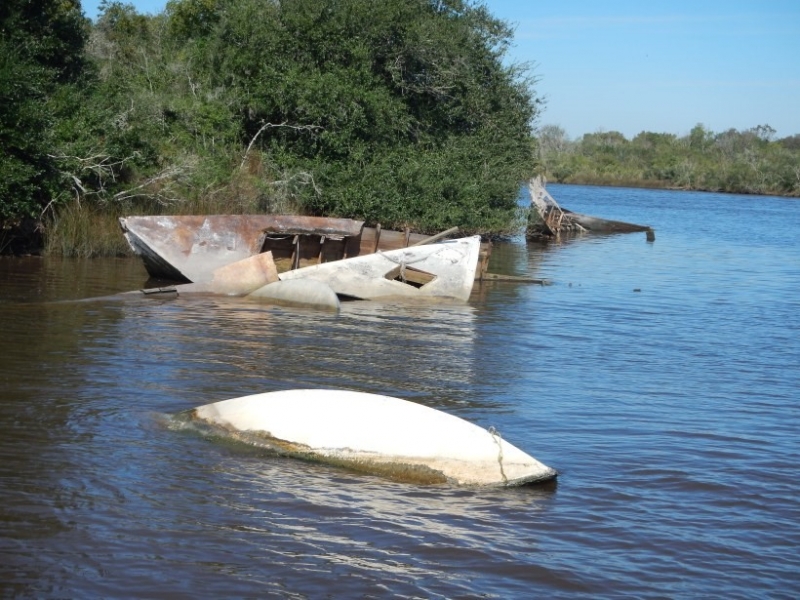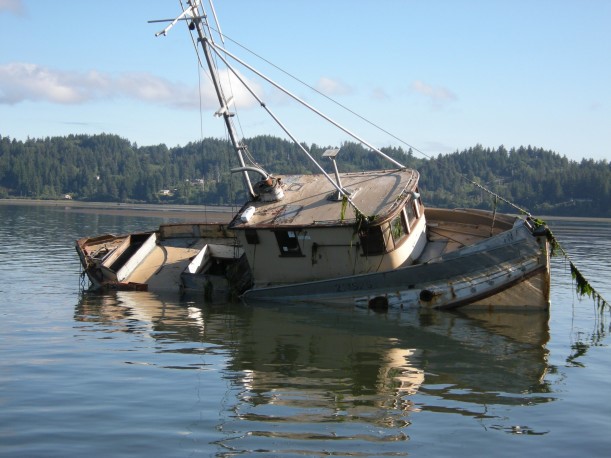By: Amanda Laverty, Communications Specialist for the NOAA Marine Debris Program
We’re spending March talking all about marine debris and its types, sources, impacts, and solutions. Tune in throughout the month to learn more about this important topic and how we can all be part of the effort to make our lives and our ocean #DebrisFree.
Though the legal definition of an “Abandoned and Derelict Vessel” varies, an “ADV” is generally considered to be any vessel in significant disrepair that may pose a threat to the public or the environment. “Derelict” frequently refers to vessels that are dilapidated with an identifiable owner, while “abandoned” vessels are those where the owner is unknown or has surrendered rights of ownership.

Vessels can become abandoned and derelict for many reasons, ranging from neglect to theft, to catastrophic weather. Hurricanes and tropical storms that impact U.S. coasts can be an overwhelming source of ADVs. Boats left in the water during storms can be sunk or tossed against nearby piers or other boats, becoming severely damaged or derelict. Unfortunately, many ADVs resulted from Hurricanes Harvey, Irma, and Maria during last year’s devastating hurricane season. This debris has been one of the primary focuses of marine debris post-storm efforts in the impacted areas.
ADVs aren’t just aesthetically unpleasing, they can also create real problems by damaging important habitat, creating hazards to navigation and recreation, leaking pollutants into the environment, and impacting fisheries resources. This type of debris can be extremely difficult and costly to remove, making the issue challenging to address. For those vessels that are removed, limited options for disposal can continue to create difficulties.
To help assist those trying to navigate ADV removal, the NOAA Marine Debris Program created the ADV InfoHub. This resource provides a central source of ADV information, where users can access information on legislation, funding, and current ADV Programs, as well as links to relevant publications, case studies, and legal reviews. Information is also provided on which agency to contact for more information on ADVs in each U.S. state.
To help diminish the impacts of debris (such as ADVs) resulting from events like severe storms, the NOAA Marine Debris Program facilitates response-planning efforts in coastal states. These efforts result in response guides, which are meant to improve preparedness for response to and recovery from severe marine debris events by outlining existing responsibilities and procedures in one document for easy reference.

Being knowledgeable about how to prevent vessels from becoming derelict, and how to address them if they do, is an important step to reducing the impacts this large debris item has on our environment.

Thank you for this article hightlighting abandoned vessels and aquatic squatters on derelict boats. Local city and county resources seem to have their hands tied on the issue and are unable to cope.
Funding to remove these hazardous vessels is lacking, as is political will of the public. However, it is demoralizing to see these trash heaps sinking in our rivers (the Willamette) and San Francisco Bay and Sacramento delta, all contaminated with this problem. Any and all help from NOAA is appreciated. Legal, and funding, and science data help work towards resolution and reduce our trash heaps in the waterways!